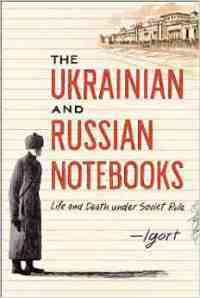The Ukrainian and Russian Notebooks by Igort
 Monday, April 11, 2016 at 10:40AM
Monday, April 11, 2016 at 10:40AM 
First published in separate volumes in Italy in 2010 and 2011; published in translation in a combined volume by Simon & Schuster on April 26, 2016
The Ukrainian and Russian Notebooks is a collection of brief stories about Russia and Ukraine. Some are the stories of individuals. Some are the stories of eras. One is the story of land. Another is the story of radioactive land. The volume combines two separate notebooks, one devoted to Ukraine, one to Russia, but the stories necessarily overlap.
Some of the stories told in The Ukrainian and Russian Notebooks are almost like recordings of oral histories related by elderly survivors. An old woman talks about the Famine. An old man describes the hardships of his life during World War II and after Stalin. The stories combine to form a graphic modern history of two countries and their peoples told from deeply personal perspectives.
The notebook entries jump around in time and place. Some are repetitive. I suppose that’s the nature of a “notebook” format, so I don’t see the lack of organization or conciseness as a significant failing.
Both of the notebooks address the Ukrainian Famine of 1932-33 (one of the worst acts of genocide in modern history) and the earlier relocation/deportation of kulaks (property owners). Stalin regarded Ukrainian kulaks as class enemies, even if they only owned a couple of cows. Viewing self-sufficient farms as a threat to collectivist ideals, Stalin used the military to block the borders of Ukraine and to confiscate food, animals, and property. Millions people died of starvation or related disease during the forced famine. The exact number is both disputed and unknowable, and depends upon whether indirect deaths are counted (Igort adopts one of the highest estimates), but there is no dispute that the Ukrainian population suffered immensely as a result of Stalin’s policies.
Some stories of the famine are told by its survivors but other entries, less personal but all the more chilling because of their detachment, reproduce excerpts from official reports. The reports contain stark accounts of illness caused by eating rotting food and animal carcasses. Instances of cannibalism, the living eating the dead, are itemized by district.
A variety of perspectives capture life during the Second World War, during the reign of Khrushchev, and after the fall of communism. Interestingly, some of the people who tell their stories view life under Khrushchev as the high point of their national history, and view the fall of communism as a disaster. In the absence of a planned transition, prices skyrocketed, jobs were lost, and once productive fields were abandoned. Production was replaced by destitution. The fantasy that western nations have constructed around the fall of communism is far removed from the reality that Russians and Ukrainians have endured.
Igort describes the present Russia as a brutal “sham democracy.” He illustrates that belief with several entries that revolve around Anna Politkovskaya, who was murdered in 2006 for (in Igort’s view) speaking the truth about Chechnya. Igort writes of journalists and activists who have been gunned down, of Chechens who have been tortured and who have turned to terrorism in support of their cause, of Russian military violence that might well be defined as state-sponsored terrorism.
The art accompanying the texts is bleak. It gives the impression of an artist’s sketchbook. The art is well-suited to illustrate the stories that Igort tells. The best images are leafless trees, footprints in vast stretches of snow, symbolic expressions of lost hope.
The Notebooks are ambitious, perhaps too ambitious. When Igort writes about the scope of Russian history and Tolstoy and Dostoevsky he strays from the personal stories that he does best. I appreciate the desire to provide context, but the book seems scattered when Igort tries to look at the bigger picture. Still, as a graphic reminder of the suffering of Russians, Ukrainians, and Chechens in an oppressive system, Igort succeeds admirably.
RECOMMENDED
 TChris |
TChris |  Post a Comment |
Post a Comment |  Igort in
Igort in  Graphic Novel,
Graphic Novel,  Nonfiction
Nonfiction
Reader Comments